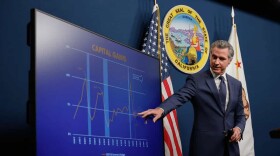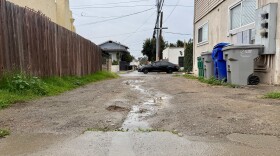Over the next few weeks Weekend Edition Saturday will be producing stories about the business of putting on free concerts, how they work and what they bring to their communities. Last week's story was on free shows at The Kennedy Center in Washington, D.C.
New York City is an expensive place to live, but there are plenty of bargains to be had, especially if you like free music. The city boasts hundreds of free summer concerts, indoors and out, in all genres of music. This year, it's also seen a few major cancellations, including one of its marquee attractions, the New York Philharmonic's annual Concerts in the Parks series.
The New York Philharmonic's free concerts in Central Park have been a summer tradition since 1965. They were a formative experience for many New Yorkers, including the orchestra's current music director, Alan Gilbert. Gilbert grew up around the Philharmonic and his mother still plays violin in the orchestra. "I've been going since I was a kid," Gilbert says.
In a Philharmonic promotional video, he praises the concert series as a vital part of his experience leading the orchestra. "It's really one of the ways that you can feel a connection between the orchestra and the city," Gilbert says, "It makes me proud to be part of the philharmonic, and to be a New Yorker."
Gilbert has conducted the orchestra in Central Park several times, but he won't this summer. In June, just over a month before they were scheduled to begin, the Philharmonic canceled its 2011 Concerts in the Parks series.
Orchestra officials declined our request for an interview about the cancellation, saying that the orchestra is focusing its resources instead on two free concerts in September, including one to mark the 10th anniversary of September 11th. They insist the Concerts in the Parks will be back next year.
The New York Philharmonic isn't the only nonprofit struggling to maintain its free concerts.
Martin Riskin runs Free for All at Town Hall. For almost a decade, he's presented a handful of spring concerts by A-list chamber music artists at Town Hall in Manhattan, free of charge. Riskin was able to support the cost of the concerts – about $200,000 a year – with the help of a generous donor who recently passed away.
This summer, Free for All is on temporary hold. "We lost a tremendous bit of funding," Riskin explains, "Therefore we felt it's best not to have a regular season, but to rebuild."
While Riskin's series relies on good old-fashioned private philanthropy, much of New York's free music scene now depends on corporate money.
James Burke directs the nonprofit SummerStage festival, which puts on more than 100 free concerts a year in Central Park and other venues around the city, at a cost of about $5 million.
"Usually when one funding source is lacking, we've been able to make it up from another source," Burke says, "We get, you know, resourceful." For example, SummerStage rents out its Central Park mainstage to ABC for concerts that are broadcast on Good Morning America.
SummerStage has been in the free concert business since the 1980s. The City Parks Foundation started the concert series in hopes that it would make Central Park seem safer and more inviting. The model worked so well that it's been copied by parks all over the city.
Catherine Radbill, a music business professor at New York University, says there's an unprecedented glut of free outdoor concerts in the city, all summer, in all five boroughs.
"When I lived here in the late '70s, early '80s, there wasn't nearly this much," she says. "We called it the silly season. Because there was just not that much gong on. And people kind took off, hung around, read books instead."
Now, Radbill says, there are concert series in the Queens Botanical Garden, Bryant Park, Lincon Square's Richard Tucker Park—and the list goes on. "It's endless."
The overabundance of free music may be great for audiences, but it's created a challenge for festival presenters. Burke, who pioneered the free festival model with SummerStage, says he now faces stiff competition to book acts for his shows. "Sometimes we're going after the same bands," he says, "so there's little bidding wars."
To thrive in this competitive environment, Burke says SummerStage has turned to its audiences for help. Concert-goers can become members with a donation of $150 or more, and enjoy perks like skipping to the front of the line. With a donation of $1000, members can enjoy perks like access the "JetBlue Flight Deck," a viewing platform near the stage built by one of the festival's corporate sponsors.
The ability to turn free concert audiences into paying customers is something any presenting organization would envy, Radbill says. A membership model lets them to know who their audiences are so they can market to them later.
Radbill thinks a membership model could help the New York Philharmonic when it re-launches Concerts in the Parks next year.
"If I were running the Philharmonic, I would say, 'Let's look at the cost-benefit analysis here. How am I going to capture the data of those people attending the concerts, so that I can persuade them to try coming indoors in November or December, and paying for a show?'"
Increasingly, Radbill says, corporate sponsors and concert presenters need to be reassured that when they give away product for free, they'll get something tangible in return.
There may be more free music in New York City than ever before, but free music isn't quite as free as it used to be.
Copyright 2022 NPR. To see more, visit https://www.npr.org. 9(MDAzMjM2NDYzMDEyMzc1Njk5NjAxNzY3OQ001))







